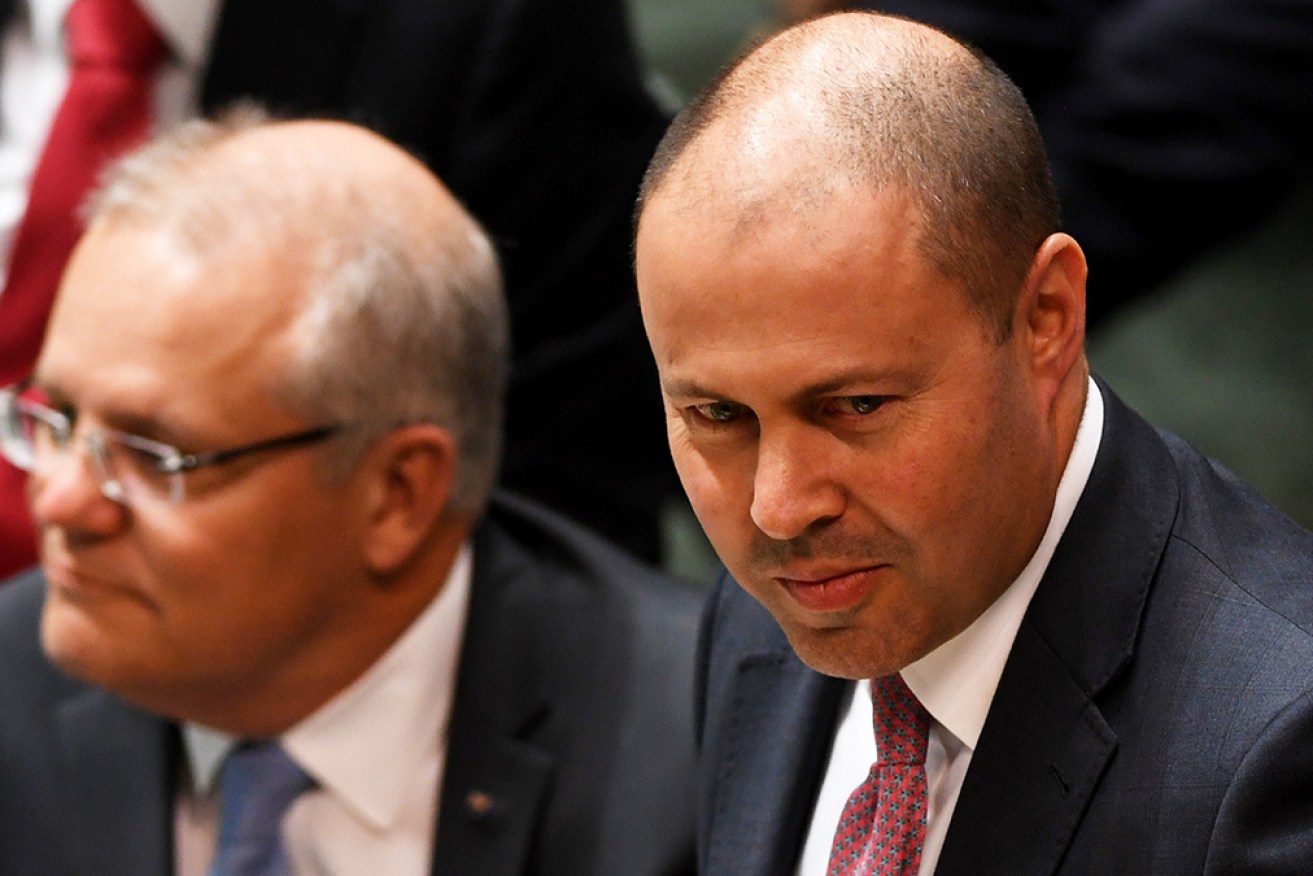Nobody is dancing at Josh Frydenberg’s stimulus party


The PM and Treasurer clearly believed a budget surplus was the only promise that really mattered. Photo: AAP
Josh Frydenberg announced a stimulus party when delivering his April budget – tax cuts, infrastructure spending, “strong economy”, good times.
Five months later, the punch bowl hasn’t been touched, the Jatz have gone stale, the gladioli have wilted and nobody’s dancing – the band hasn’t turned up.
As we reported at the time, the fine print in the budget documents showed even Mr Frydenberg’s own department didn’t think it was going to be much of a party. Treasury was quietly forecasting weaker consumption with falling GST collections.
It’s only two-and-a-bit months into the financial year, but it’s already worse than Treasury feared.
By the looks of last week’s Australian Bureau of Statistics July retail sales figures, consumers didn’t open their invitation to the party – we actually spent less than in June.
And now the August National Australia Bank business conditions and confidence survey shows business isn’t coming to the party either.
Consequently, NAB’s economics team is reviewing its forecast of a 25-point Reserve Bank interest rate cut in November. Nudge, nudge, wink, wink – it sounds like NAB’s forecast will move to a 50-point cut.
The government spin has been that the impact of tax cuts and lower interest rates will kick in any time now. After the dismal July retail sales, the hope was that the tax refunds were taking a while to be felt in consumers’ pockets, but August would be better.
Well, yes, but no. The NAB survey found there was an uptick in retail activity in August from July, but retail was so far down in the dumps, it didn’t really matter – retail remains deeply negative.
NAB’s chief economist, Alan Oster, said this indicated household consumption remained weak well into the September quarter.
“It looks like the tax cuts have had little impact on household consumption or have not been large enough to offset increasing weakness in the sector,” he said.
“The two rate cuts also may have had little impact, though this is expected with the longer and more variable lags of monetary policy.”
That’s the problem with relying on monetary policy to stimulate the economy – lower interest rates take time to filter through to greater economic activity.
The two RBA rate cuts have already played a role in re-igniting housing prices in Sydney and Melbourne, but it takes many months for that to result in more consumption and jobs.
The higher prices eventually stimulate greater housing sales volume, which in turn encourage more household goods sales as people move into their new homes and, eventually, encourages developers to build more houses and units – once existing stock looks like being cleared.
If the real estate trend is sustained, there’s unlikely to be much broader pay-off for the economy until sometime next year. By then, the party pies and chicken wings warming in Mr Frydenberg’s bain-marie will have a dubious bacteria count, never mind the ever-cheaper money fuelling an asset bubble that increases wealth inequality. It becomes a different sort of party for the few at the expense of the many.
The other key message from the NAB survey is that business continues to hold off investing, until it feels confident that the consumer will start dancing some time.
“Business confidence and our other forward-looking indicators suggest there is unlikely to be an imminent turnaround in business conditions,” said Mr Oster.
“While conditions are still positive, they have now been below average for some time and point to a significant loss of momentum in private demand.
“It is possible global developments have begun to weigh on the business sector, but domestically the weakening in consumption growth and the downturn in the housing market have clearly weighed on the business sector.”
The audio guys have given up on the band. They’ve started putting the speakers away.
Not everyone is miserable at the Frydenberg non-party – the miners have brought their own slab and steaks and are happily downing tinnies around a barbie out the back.
That has seen business conditions and confidence pick up strongly in the West. After underperforming since the resources construction bubble burst, WA business conditions have jumped to be the strongest in the country.
What’s yet to be seen though is how/when/if that improved mining activity flows through to WA consumers. The Australian mining industry boasts world’s best practice in a number of fields – including screwing down costs.
The mining resurgence is doing wonderful things for Mr Frydenberg’s budget, providing that Holy Grail of Australian fiscal policy: a budget surplus.
At least some of that surplus could be used to hire another band, improve the quality of the booze on offer, to send out another round of invitations, but the Frydenberg party planners will have none of it.
The fine wine will stay locked away, only light beer is being served and, with the ice long since melted, it’s no longer cold. The party is a flop.








